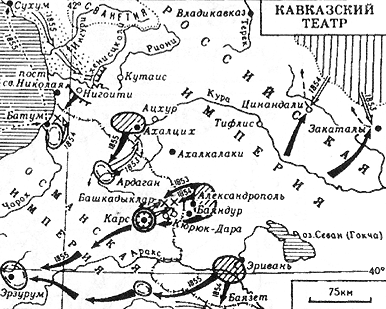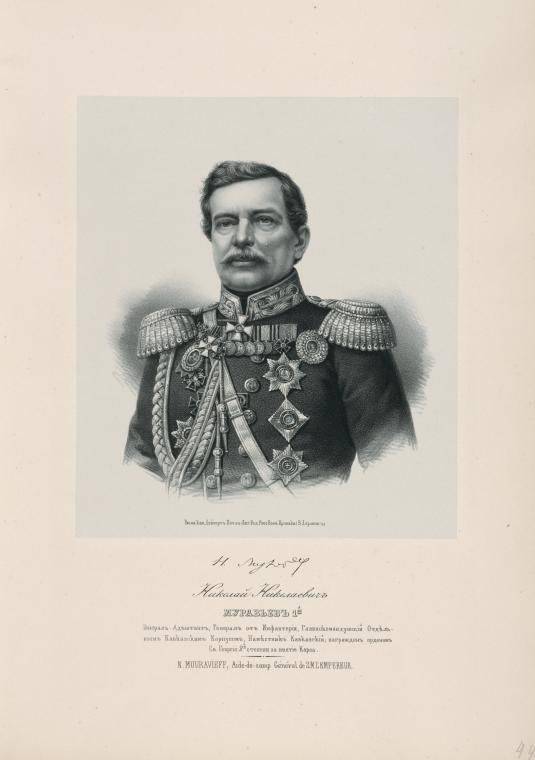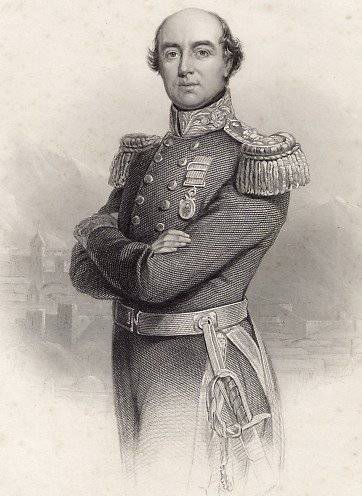The most brilliant victory of the Eastern (Crimean) War
 Taking Kars in 1855 was the last significant operation and the biggest victory of the Russian weapons in the Crimean War. The siege went from June to November 1855. Kars was the most important Turkish stronghold of eastern Turkey and was considered impregnable. This victory predetermined the outcome of the war on the Caucasian front of the Crimean (Eastern) campaign. The Caucasian viceroy and the commander of the Separate Caucasian Corps, Nikolai Nikolayevich Muravyov (1794 — 1866), led the siege. He distinguished himself in 1828 at the first capture of Kars.
Taking Kars in 1855 was the last significant operation and the biggest victory of the Russian weapons in the Crimean War. The siege went from June to November 1855. Kars was the most important Turkish stronghold of eastern Turkey and was considered impregnable. This victory predetermined the outcome of the war on the Caucasian front of the Crimean (Eastern) campaign. The Caucasian viceroy and the commander of the Separate Caucasian Corps, Nikolai Nikolayevich Muravyov (1794 — 1866), led the siege. He distinguished himself in 1828 at the first capture of Kars.Caucasian Front 1853-1855
From the very beginning of the Eastern war, the Russian army led successful operations on the Caucasian front. This was explained by the fact that the Russian Caucasian Army had a vast experience of military operations in the mountains. Russian soldiers here were constantly in conditions of a small war with the mountaineers and tensions on the Turkish and Persian borders. At the head of the army were decisive, enterprising commanders, aimed at active operations.
The Ottoman Sultan and his British and French advisers planned to unite the Turkish army with the highlanders of Shamil, cut off the Russian army in Transcaucasia, which could lead to its complete destruction. And then move the fighting to the North Caucasus. By the beginning of hostilities in the Caucasian theater, the Turkish command had a very significant force in this area - the 100 thousand army. 25 thousand people with 65 guns were located in Kars, 7 thousand people with 10 guns in Ardahan, 5 thousand people with 10 guns in Bayazet. In addition, a significant grouping was located in Batumi. The commander in chief of the Ottoman troops was Abdi Pasha. Great hope was on the forces of Shamil, who had more than 10 thousand fighters. Two attack groups were formed for the offensive: 40-thousand. Anatolian army aimed at Alexandropol, 18-thousand Ardagan detachment on Akhaltsikh and Tiflis.
The approach of the war came as a surprise to the Caucasian governor, Mikhail Vorontsov. Russian troops stationed in Alexandropol, Erivan and its surroundings, in Akhalkalaki, Akhaltsikhe. Initially, the Russian forces were insignificant - only 19½ battalions, a small number of Nizhny Novgorod dragoons and irregular cavalry. In the autumn, when the gap with Porto became obvious, the Russian troops in the Transcaucasus were reinforced: the 13 Infantry Division (13 thousand soldiers) were transferred to Georgia by sea, 10-thousand were formed. Armenian-Georgian militia. 30-thousand was formed. Army group under the command of Lieutenant-General Prince Vasily Bebutov.
The first to open the fighting was Shamil. True, he was somewhat hurried, starting them before Turkey entered the war. 5 September 1853 of the year 10-th. A detachment of highlanders appeared near the village of Zakartaly in the Alazani Valley. Russian troops began to push the enemy into the mountains. 17 September Shamil with the main forces attacked an unfinished redoubt near Mesed el-Kera. The position of the besieged was critical, but they were saved by a detachment of the commander of the Caspian region, Prince Argutinsky, who made an unprecedented march from Temir-Khan-Shura directly through five Caucasian ridges. Shamil was forced to withdraw the troops. Having failed, Shamil then remained idle for a rather long time, awaiting the appearance of the Turkish army. However, the Russian command had to reckon with the presence of this threat.
The first clash with the Turks occurred on the night of October 16 (28): a large detachment attacked the post of St. Nicholas, who covered the road from Batum, along the Black Sea coast. Post of sv. Nicholas defended the garrison of 300 people with two guns. The Ottomans seized the fortifications, suffering heavy losses. 2 (14) November under Bayanur 6-th. Russian avant-garde under the command of Prince Ilya Orbeliani joined the battle in 30-thousand. Ottoman army and escaped defeat only thanks to quick help from Bebutov Abdi Pasha did not get involved in a decisive battle with the main Russian forces and led the troops to the Arpachay River. At the same time, the Ardahan Turkish grouping crossed the Russian border and reached the approaches to Akhaltsikh. 14 (26) November in the battle of Akhaltsikhe 7-th. Russian squad under the command of Prince Ivan Andronikov defeated 18-thousand. Ali Pasha's Turkish corps.
Bebutov, after the battle of Bayandur, went on the offensive. The Ottoman command decided to give battle to the Russian powerful defensive turn at Bash-Kadyklyar (Bashkadyklar). On November 19 (December 1) Prince Bebutov, in spite of the threefold numerical superiority of the enemy (13 thousand Russians against 37 thousand Turks), attacked. The Russian soldiers broke through the enemy’s right flank, the Turkish army, having lost 6 thousand people, retreated in disarray. The Russian army lost 1,5 thousand people. In this battle, the brave commander Ilya Orbeliani was mortally wounded. This victory was of great strategic importance. The Turkish army was inactive for several months, and Russia's authority in the Caucasus was confirmed.
After the battle at Bashkadyklar, the Russian army did not undertake serious operations. Emperor Nicholas was a supporter of a decisive attack on Batum, Ardagan, Kars and Bayazet. But Vorontsov, supported by Prince Paskevich, was cautious, pointed to the comparatively small number of Russian troops (and it was not possible to weaken the army in the European part of Russia), the lack of military supplies, the onset of winter, offering to postpone the offensive until spring. This allowed the Turkish command to restore the army and bring its number to 120 thousand people. They also replaced the commander - it was headed by Mustafa-Zarif-Pasha.
The Russian army strengthened not so much - up to 40 thousand bayonets and sabers. The commander-in-chief divided the army into three parts: the main forces under Bebutov - 21 thousand people, covered the central sector in the Alexandropol direction; Akhaltsikhsky detachment of Andronikov - 14 thousand people, defended the right flank from Akhaltsikha to the Black Sea; The detachment of Baron Wrangel - 5 thousand people, defended the left flank, Erivan direction.
Active fighting resumed in spring 1854. The 1854 campaign of the year was successful for the Russian army. The Akhaltsikhe detachment was the first to fight. At the end of May 12-th. The corps of Gassan Bey from the Batum district moved to Kutaisi. He was met by 3-th. detachment of Lieutenant Colonel Prince Nikolai Eristova. 28 May 1854, the Turkish corps was utterly crushed and fled to Ozugert. The Ottomans lost 2 thousand people, including the commander - Gassan Bey. Russian squad lost around 600 people. The broken parts of the Gassan-Pasha corps were combined with the Selim-Pasha corps, the number of the Turkish group reached 34 thousand soldiers. Ivan Andronnikov gathered his forces into a fist and, without allowing Selim Pasha to go on the offensive, he himself went on the attack. June 8 near the village Nigoeshti Russian troops defeated the 12-thousandth vanguard of the Turkish army. June 16 in the battle of the river Cholok Russian troops defeated 34-thousand Turkish army under the command of Selim Pasha. The Ottomans lost 4 thousand people, Russian troops - 1,5 thousand. These victories secured the right flank of the Russian army in the South Caucasus.
In the middle of July the highlanders of Shamil showed themselves. 7 thousand Shamil squad appeared in the Alazani Valley. This time his raid was more successful, the mountaineers captured more booty and many prisoners, quietly left. In general, this attack had a predatory nature, not being a combat operation. Prince Argutinsky resigned, and the new command did not show determination.
The Turkish command, having failed to break into Russian territory in the Black Sea coast, decided to strike in the Erivan direction. In July, the 16-thousandth Turkish corps launched an offensive from Bayazet on Erivan. Baron Karl Wrangel did not take a defensive position, deciding to attack. The Russian detachment reached Chingilsky Pass by forced marches and on July 29 defeated the numerically superior forces of the Turkish army in a head-on battle. The Ottomans lost 2 thousand people, the detachment of Wrangel - about 400 people. Baron organized an energetic pursuit of the enemy and July 31 took Bayazet. Most of the Turkish troops just fled, about 2 thousand retreated to Van. Thus, the Russian troops secured the left flank of the Caucasian Front.
Prince Bebutov’s forces did not take active steps for a long time - the commander-in-chief did not have the forces and means to assault Kars, when he was opposed by more than three times the superior Turkish army. By June 20 (July 2), Russian troops approached the village of Kuryuk-dara, and began to wait when the Ottomans left the fortress and enter the decisive battle. The Turkish command gained courage for about a month. Hoping for numerical superiority, the Ottomans abandoned their fortified positions and attacked Russian troops. 5 August 1854 of the year 18-th. Russian army commanded by General Bebutov entered into a decisive battle with 60-thousand. Turkish army. The fierce battle lasted 4 hours. Bebutov, used the expansion of the enemy army, and broke it in parts - first on the right flank, and then in the center. The victory was facilitated by the skillful use of artillery and rocket weapons - the Konstantinov rocket. The Ottoman army lost 10 thousand people, Russian losses - 3 thousand people. The defeated Turkish army retreated to Kars. Bebutov, given the numerical superiority of the Anatolian army - she retained up to 40 thousand people and the power of the Karsky fortified area, did not consider it possible to storm Kars. Having received the news of the defeat of the Turkish army, Shamil did not disturb the Russian troops until the end of the war.
Nikolai Nikolaevich Muravyov
At the beginning of 1855, General Nikolai Muravyov was appointed commander-in-chief of Russian troops in the South Caucasus. The fate of Muravyov-Karsky (nicknamed “Karsky”, received for taking Kars during the Crimean War) is quite whimsical. Born 14 July 1794 in the capital of the empire. His father was Major General Nikolai Nikolayevich, and his mother was Anna Mikhailovna (nee Mordvinova). Muravyov began serving as a column leader in the emperor's retinue in the quartermaster unit. Because of his excellent knowledge of mathematics, he was sent by the examiner to the Corps of Railway Engineers, and then taught geometry in mathematical classes at the drawing office of the Suite of His Majesty. He was the caretaker of the Columnar School, as well as the library manager. He was fascinated by the ideas of Freemasonry, and even with his comrades-in-arms developed a charter for a special society that was to establish a socialist republic on Sakhalin. The 1812 War of the Year put an end to these youthful dreams.
During the 1812 campaign of the year, he served in the corps of Grand Duke Konstantin Pavlovich, at the Main Apartment, took part in the Battle of Borodino (for it was awarded the Order of St. Anna 4 degree). After the liberation of Moscow, he served in the corps of Miloradovich, who advanced in the forefront and participated in a number of battles and battles. Since 1813, the participant of the Foreign campaign of the Russian army. Ants distinguished himself in many matters: under Lutzen, Bautzen, Dresden, Kulm, Leipzig and the capture of Paris. He was awarded the Order of St.. Vladimir 4 degree and the Order of St.. Anna 2 degree. Consistently produced in lieutenants, lieutenants and chief quartermaster at the Guards Cavalry Division. Returning to Russia, he was transferred to the Guards General Staff. In 1816, the captain Muraviev was seconded to A.P. Yermolov. He was a member of the emergency embassy in Persia, and then made an expedition to the eastern shores of the Caspian Sea and to Khiva. In 1821-1822 made the second expedition to the east coast of the Caspian Sea.
In the Russian-Persian war 1826-1828. commanded the 13-m of the Erivan Life-Grenadier Regiment, was an assistant chief of staff of a separate Caucasian corps. He distinguished himself in cases against the Persian commander-in-chief Abbas-Mirza, with the capture of the fortress of Abbas-Abad, with the capture of the fortress of Merenda and Tabriz. Muravyov was promoted to major general. When the Russian-Turkish war of 1828 — 1829 began, he commanded the Caucasian Grenadier Reserve Brigade and distinguished himself during the capture of Kars. Muravyov under the leadership of Paskevich in this campaign participated in the battles of Akhaltsykh and the subsequent capture of this fortress, during the occupation of Erzerum and Bayburta and other matters. He was awarded the Order of St.. George 4 degree, Order of St.. Anna 1 degree, Order of St. Vladimir 2 degree. For Akhaltsyh Muravyov was awarded the Order of St. George 3 degree and Order of St.. George 3 degree.
Due to disagreements with Paskevich, Muravyov was transferred to Poland, where he took part in suppressing the Polish uprising of the 1831 year. Ants commanding the grenadier brigade, was noted in the storming of Warsaw and was promoted to lieutenant general. He was appointed commander of the 24 Infantry Division and was awarded the Polish Order of Military Valor 2 class.
In 1832-1833 served as a military diplomatic mission in Egypt. Ants was granted an adjutant general, was the commander of the 5-th army corps. In 1834, Muravyov wrote a note “On the causes of escapes and the means to correct the deficiencies of the army”, where he provided a lot of valuable information and suggested measures to improve the situation in the armed forces. He retired and returned to service in 1848, the chief commander of the reserve battalions of the 3, 4 and 5 infantry corps. Then he was appointed a member of the Military Council and commander of the Grenadier Corps. In December, 1853 was appointed to the generals of infantry, and in November, 1854, the governor of the Caucasus and the commander of the Separate Caucasian corps. Muravyov was assigned to lead the Caucasian Front of the Crimean (Eastern) War.

Kars
The Russian army besieged Kars four times in the 19 century: in 1807, 1828, 1855 and 1878. In 1807, a detachment of Major General Nesvetaev as part of the 6 infantry battalion and two Cossack regiments began storming the fortress, which was defended by a 10 garrison of thousands of people. The attack, in the success of which the Ottomans were confident, was stopped on the orders of Commander-in-Chief Gudovich. In 1828, the fortress was taken by Paskevich’s troops.
Since that time, the fortress has seriously changed. The Ottoman government, conscious of the importance of this fortress in the wars with the Russian Empire, took advantage of the services of British military engineers. First-class European fortifiers included Sharokh, Chakmak and Karadag heights into the defense system. They built modern fortifications. Below the Old Fortress, on the right bank of the Kars-Chay River, a new bastion was built - Arab-Tabiya, armed with powerful caliber implements. The whole fortress line consisted of redoubts, trenches and a high shaft. Artillery batteries well shot through the near and far approaches to the fortifications. The flanks of the fortress were well protected by nature - rocky mountains and steep banks of the river. The message across the river passed through stone bridges and two pontoon bridges. Fortress garrison reached 30 thousand people. And these were regular troops, not the majority of the militias, as in 1828. In addition, on the Caucasian front, many foreign mercenaries fought on the Ottoman side, including members of the Polish uprising of 1830-1831. and the Hungarian Revolution 1848 of the year. They fought against Austria-Hungary and Russia, had a great combat experience, many changed their names and converted to Islam. For many such exiles, the struggle against the Russians has become the goal and the work of a lifetime. The Anglo-French command refused to use them on the Crimean front, so the former rebels fought in the Caucasus. In particular, the Hungarians Kmeti and Kolman became Ottoman pashas - generals.
The commander in chief (Mushir) in 1855 was Vassif Pasha. He was little knowledgeable in military affairs, so virtually all the affairs of the British adviser - William Fenwick Williams. He knew Turkish affairs well, being a military adviser in the Ottoman Empire since 1841. With the beginning of the Eastern War, Williams formally switched to the Turkish service with the rank of Ferik (Major General). Thanks to his efforts, the Kars garrison was well prepared for defense, having an 4-month supply of food, and the fortifications were strengthened. Erzerum was turned into a rear army warehouse.

William Fenwick Williams.
To be continued ...
- Alexander Samsonov
- The most brilliant victory of the Eastern (Crimean) War
The most brilliant victory of the Eastern (Crimean) War. Part of 2
Information